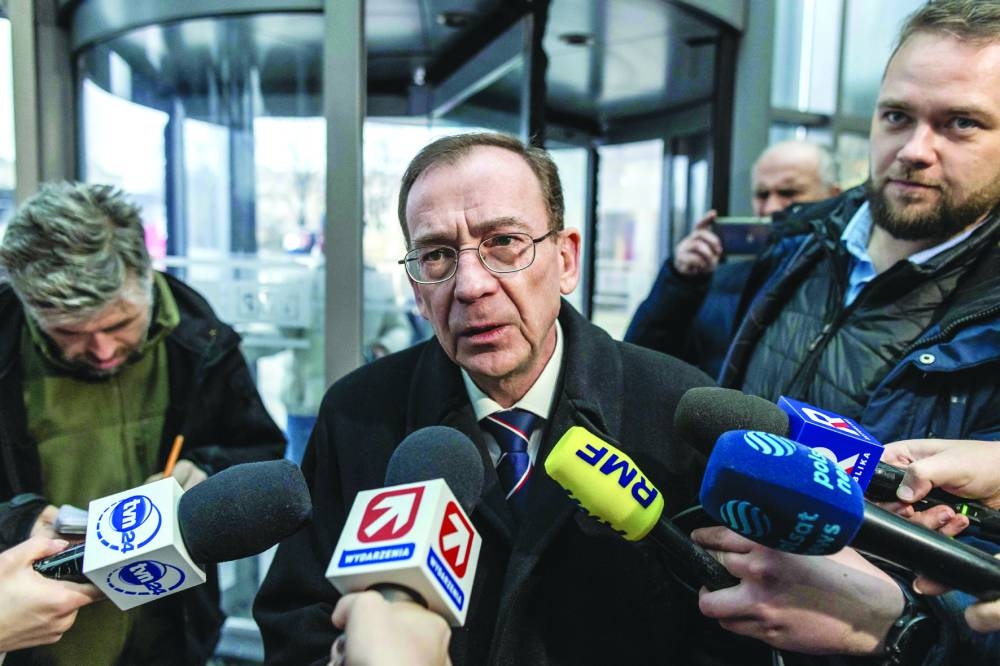Former Polish interior minister Mariusz Kaminski said he had started a hunger strike as a “political prisoner” on Wednesday, a day after he was detained by police at the presidential palace and sent to jail on abuse of power charges.
The events mark a gear change in new Prime Minister Donald Tusk’s efforts to undo policies of his predecessors, the nationalist Law and Justice (PiS) party, and punish those accused of wrongdoing during their time in power.
PiS faced accusations of subverting the rule of law during their eight-year time in office. Tusk’s pro-European coalition’s drive to bring Poland back in line with European Union democratic standards and unblock tens of billions of euros in EU funding pits him against PiS ally President Andrzej Duda.
“I declare that I treat my conviction...as an act of political revenge,” Kaminski said in the statement, read by his former deputy Blazej Pobozy at a press conference in front of the prime minister’s office.
“As a political prisoner, I started a hunger strike from the first day of my imprisonment.”
Police entered Poland’s presidential palace to detain Kaminski and another of his former deputies, Maciej Wasik, on Tuesday. The two politicians had remained in the palace after attending a ceremony there earlier in the day.
Kaminski’s lawyer told private radio RMF FM he is preparing a complaint against his Tuesday detention as well as against the court’s order to send him to prison. The station reported earlier that he was also preparing a final appeal against a conviction to the Supreme Court — a cassation — aimed at acquittal.
PiS lawmaker Kaminski was convicted of abuse of power for allowing agents under his command to use entrapment in an investigation. He denied wrongdoing and in 2015 was pardoned by Duda, allowing him to take up his government post. Last year, the Supreme Court said the case should be reopened and Kaminski and Wasik were sentenced by a lower court in December to two years in prison.
“I want to say clearly that if a politician is in prison, it does not mean that he is a political prisoner,” Deputy Justice Minister Maria Ejchart said.
“Everyone has the right not to eat or drink, it is an individual decision,” she added. “In a situation where a person is under the care of the state, when someone is convicted, he or she is subjected to medical examinations, body measurements, how the body reacts to the decision to stop eating.”
Former prime minister and current PiS MP Mateusz Morawiecki called on representatives of EU institutions and other international organisations to take “an unequivocal stand on this appalling turn of events”.
“I appeal to the democratic community of the West not to look passively at what is happening in Poland today,” he said in a party statement.
The Helsinki Foundation for Human Rights said in a statement that calling Kaminski and Wasik “political prisoners” is a deeply unfair distortion, directly damaging the memory of people actually imprisoned because of their beliefs, attitudes, and fight for democracy and human rights.” Duda said on Wednesday he “would not rest” until Kaminski and Wasik were freed and said he believed his pardoning of the pair in 2015 was in line with the constitution. He reiterated on many occasions that he believed his pardon should stand.
Lawyers had questioned whether Duda had the power to pardon Kaminski before an appeals court had issued a final ruling.
Hundreds of PiS supporters gathered on Tuesday in front of the presidential palace and at a police station where the pair were held to protest their detention.
International
Ex-Polish minister in prison hunger strike
President Duda says he ‘will not rest’ until ministers are freed

Mariusz Kaminski (left), entering the headquarters of Polish Public TV in Warsaw, on December 20. Right: Polish President Andrzej Duda gives statement to media after police entered presidential palace to detain the ex-minister. (AFP, Reuters)

